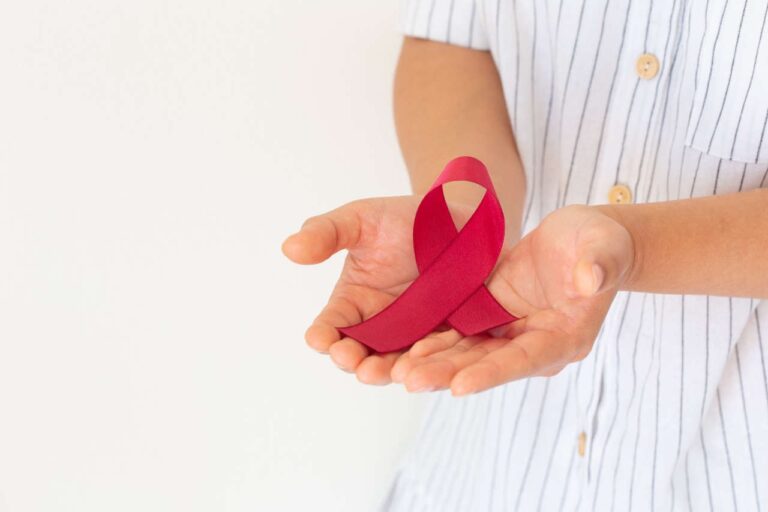
What Is Opdivo?
Opdivo is a brand name for the medication nivolumab, which is a type of immunotherapy drug used to treat certain types of cancer. Opdivo was first approved by the FDA in 2014 to treat advanced melanoma that is unresponsive to other types of treatments. Since then, Opdivo has been approved for several other types of cancer due to its successful clinical trial data supporting its safety and effectiveness in treating various cancer types.
Vorbește cu un specialist
Despre asistența pentru coplatăThis immunotherapy medication belongs to the anti-programmed cell death-1 (PD-1) drug class, which mainly targets and blocks the activity of specific proteins that suppress the immune system.
Opdivo is only available by prescription and comes in a single-dose vial solution for injection.
What Is Opdivo Used To Treat?
Since the first approval of Opdivo until now, the FDA has approved the use of Opdivo in the treatment of several types of cancer, which include:
- Melanoma (advanced skin cancer)
- Metastatic non-small cell lung cancer
- Squamous cell carcinoma of the head and neck
- Classical Hodgkin’s lymphoma (cancer of lymphocytes)
- Hepatocellular carcinoma (liver cancer)
- Urothelial carcinoma (cancer of the bladder and urinary tract)
- Advanced renal cell carcinoma (cancer of the kidney)
- Colorectal cancer (bowel cancer)
- Esophageal cancer (cancer that develops in the esophagus)
- Malignant pleural mesothelioma (cancer of the lung’s lining)
- Gastric cancer (stomach cancer)
- Gastroesophageal junction cancer (cancer that occurs where the esophagus meets the stomach)
- Esophageal adenocarcinoma (cancer that begins in the glandular cells of the esophagus)
Opdivo is commonly used to treat advanced or metastatic cancer that has invaded other body parts and is resistant to treatment with conventional therapies. It is often used alone or combined with other cancer treatments, such as immunotherapy drugs, chemotherapy, and radiation therapy.
How Does Opdivo Work?
Opdivo contains an active drug called nivolumab, a monoclonal antibody that works by helping the body’s immune system fight cancer cells. Normally, our immune system has specialized cells, specifically T-cells, that can detect and kill cancer cells. However, some cancer cells produce certain proteins called PD-L1 and PD-L2 to avoid T-cell detection. These proteins (PD-L1 and PD-L2) attach to a receptor on T-cells called PD-1 and shut down the T-cell’s activity, consequently preventing T-cells from attacking cancer cells and allowing them to grow and spread.
Opdivo is designed to bind to the PD-1 receptor on T-cells. When Opdivo attaches to the PD-1 receptor, it prevents the cancer cell proteins (PD-L1 and PD-L2) from binding to the T-cells and turning them off. This allows the T-cells to remain active and recognize and destroy cancerous cells.
By blocking the binding of PD-L1 and PD-L2 proteins, Opdivo boosts the immune system’s ability to identify and kill cancer cells, slowing down or stopping the growth of the tumor.
Dosage Form and Strengths
Opdivo is available in a single-dose vial that contains a colorless to pale-yellow solution with the following strengths:
- 40 mg/4 ml
- 100 mg/10 ml
- 120 mg/12 ml
- 240 mg/24 ml
Dosage
Dosing Information
The dosing of Opdivo depends on the type of cancer being treated and other individual factors, such as the patient’s weight and overall health. The recommended doses of Opdivo as a single agent (monotherapy) in patients with different types of cancers are as follows:
As a Single Agent (Monotherapy)
The intravenous dose of Opdivo is 240 mg once every 2 weeks or 480 mg once every 4 weeks, which is infused over 30 minutes in adult patients with melanoma, metastatic non-small cell lung cancer, advanced renal cell carcinoma, classical Hodgkin lymphoma, squamous cell carcinoma of the head and neck, locally advanced or metastatic urothelial carcinoma, esophageal squamous cell carcinoma, and colorectal cancer.
- For pediatric patients with colorectal cancer (weighing 40 kg or more), Opdivo is given intravenously every 4 weeks at a recommended dose of 240 mg over 30 minutes.
- For pediatric patients (12 years or older) with colorectal cancer and weighing less than 40 kg, the dose of Opdivo as a single agent is 3 mg/kg once every 2 weeks, over 30 minutes.
Get Financial Assistance for Opdivo
Combined With Other Therapies
The recommended intravenous (IV) doses of Opdivo in combination with other cancer treatments such as chemotherapy, immunotherapy, or radiation therapy are as follows:
For Metastatic Melanoma
Combined with ipilimumab
When used with ipilimumab, Opdivo is given into the vein over 30 minutes, once every 3 weeks, at a dose of 1 mg/kg. Ipilimumab is given on the same day intravenously over 90 minutes at a dose of 3 mg/kg. The maximum number of combination therapy doses should not exceed four. After completing four doses of combination therapy, Opdivo is given alone.
For Metastatic Non-Small Cell Lung Cancer
Combined with ipilimumab
The patient is given 3 mg/kg of Opdivo intravenously over 30 minutes every 2 weeks, along with ipilimumab, which is given at a dose of 1 mg/kg intravenously over 30 minutes every 6 weeks. The treatment continues until the disease progresses or until unacceptable side effects occur. If there is no disease progression, treatment can continue for up to 2 years.
For Gastric Cancer, Esophageal Adenocarcinoma, and Gastroesophageal Junction Cancer
Combined with fluoropyrimidine- and platinum-containing chemotherapy
Opdivo is administered intravenously every 2 weeks at a dosage of 240 mg or every 3 weeks at a dosage of 360 mg, along with fluoropyrimidine- and platinum-containing chemotherapy. The treatment can continue for up to 2 years.
For Advanced Renal Cell Carcinoma
Combined with ipilimumab
When used with ipilimumab, Opdivo is given intravenously every 3 weeks at a dose of 3 mg/kg, along with ipilimumab, which is given intravenously at a dose of 1 mg/kg over 30 minutes on the same day, up to a maximum of four doses. After completing the four doses of combination therapy, Opdivo is administered alone for up to 2 years.
Combined with cabozantinib
The intravenous dose of Opdivo is 240 mg IV over 30 minutes every 2 weeks in combination with cabozantinib 40 mg orally once daily (without food).
For Hepatocellular Carcinoma
Combined with ipilimumab
Opdivo and ipilimumab are given together for up to four doses. Opdivo is given every 3 weeks intravenously at a dose of 1 mg/kg, while ipilimumab is given on the same day intravenously at a dose of 3 mg/kg. After completing the four doses of combination therapy, Opdivo is given alone.
For Adults and Pediatrics With Colorectal Cancer
Combined with ipilimumab
Opdivo and ipilimumab are given together intravenously every 3 weeks, with Opdivo given at a dose of 3 mg/kg and ipilimumab given at a dose of 1 mg/kg over 30 minutes on the same day, up to a maximum of four doses to adults weighing 40 kg or more. After completing the four doses of combination therapy, Opdivo should be given alone.
For Malignant Pleural Mesothelioma
Combined with ipilimumab
For adult patients, the suggested amount of Opdivo is 360 mg/kg intravenously, given every 3 weeks, together with ipilimumab, which is also administered intravenously at a dose of 1 mg/kg, given every 6 weeks.
How Is Opdivo Administered?
Opdivo is administered intravenously. The IV usually takes around 30 to 90 minutes to complete. This medication is given slowly every 2 to 4 weeks.
The recommended dose and frequency of Opdivo may vary depending on the specific condition being treated and whether it is used as a standalone treatment or in combination with other cancer medications.
Obțineți asistență pentru coplată
Asistență financiarăEfecte secundare

The side effects of Opdivo may vary depending on whether it is given as monotherapy (alone) or combined with other immunotherapy drugs or chemotherapy. Opdivo side effects as a standalone treatment (which could affect more than 1 in 10 individuals) include:
- Weariness (fatigue or extreme tiredness)
- Queasiness (mild nausea)
- Muscle and bone aches
- Diaree
- Coughing
- Rashes and itching
- Reduced appetite
- Joint pain (arthralgia)
- Increase blood pressure
- Fever (pyrexia)
- Vărsături
- Dureri de cap
- Swelling
- Constipaţie
- Breathing difficulties (dyspnea)
- Durere abdominală
- Infections of the throat and nose
Patients receiving Opdivo combined with ipilimumab may experience the following common side effects:
- Low thyroid hormones (hypothyroidism)
- Decreased weight
- Decreased appetite
- Constipaţie
- Ameţeală
- Oboseală
- Diaree
- Greaţă
- Itching (pruritus)
- Durere abdominală
- Cough with vomiting
- Infecție a tractului respirator superior
Patients receiving Opdivo combined with chemotherapy may experience the following common side effects:
- Greaţă
- Decreased appetite
- Oboseală
- Erupție cutanată
- Constipaţie
Patients receiving Opdivo combined with ipilimumab and chemotherapy may experience the following side effects:
- Greaţă
- Decreased appetite
- Oboseală
- Rashes and itching
- Constipaţie
- Musculoskeletal pain
Patients receiving Opdivo combined with cabozantinib may experience the following side effects:
- Liver problems
- Palmar-Plantar erythrodysesthesia syndrome (hand-foot syndrome)
- Mouth sores
- High blood pressure
- Changes in the sense of taste
- Durere abdominală
- Oboseală
- Musculoskeletal pain
- Rash, redness, pain, swelling, or blisters on palm and soles
- Low appetite
- Stomatitis
Patients receiving Opdivo combined with fluoropyrimidine and platinum-containing chemotherapy may experience the following side effects during their treatment:
- Pain, numbness, burning, or tingling sensation on hands or feet
- Mouth sores
- Musculoskeletal and abdominal pain
- Constipaţie
- Feeling tired
- Diaree
- Vărsături
Vorbește cu un specialist
Despre asistența pentru coplatăPrecautions When Taking Opdivo
You should not take Opdivo if you:
- Have a history of autoimmune diseases such as lupus, Crohn’s disease, or ulcerative colitis.
- Have received an organ transplant.
- Had chemotherapy or radiation therapy in the past.
- Have nervous disorders such as Guillain-Barre syndrome or myasthenia gravis.
- Have liver disease.
- Are pregnant or planning to become pregnant, as Opdivo causes embryo-fetal toxicity.
- Are breastfeeding a child or plan to breastfeed.
Cost
The Opdivo intravenous solution (10 mg/mL) costs around $1,272. However, the cost may vary depending on the pharmacy you visit and your current insurance plan. Copay assistance may be available. Contactaţi-ne if you are interested in financial assistance for Opdivo.












